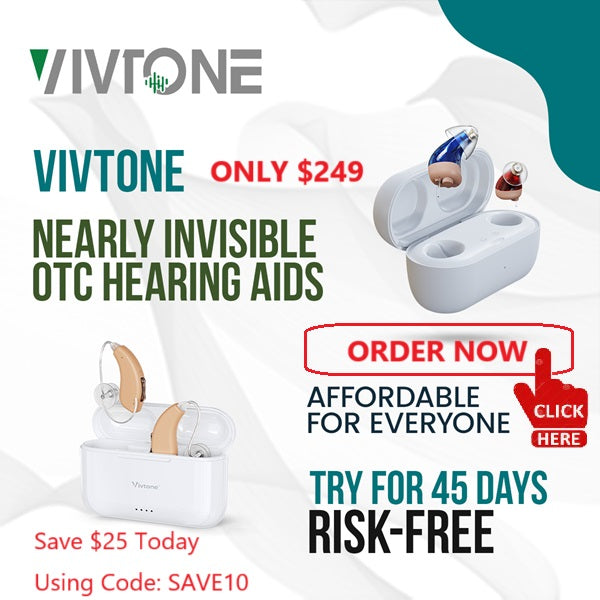Over-the-Counter Hearing Aids: What You Should Know
Navigation
- Who Should Consider Over-the-Counter Hearing Aids?
- How to Purchase Over-the-Counter Hearing Aids
- How to Adjust to OTC Hearing Aids
- How to Care For Your OTC Hearing Aids
- When to Seek Professional Help
- The Key to Better Hearing is Here

Do you strain to follow conversations in noisy restaurants? Does your family complain the TV volume is deafening? Do you hear mumbling rather than clear speech? If this sounds familiar, over-the-counter (OTC) hearing aids may offer welcome relief.
Millions struggle with untreated hearing loss, missing out on life's conversations and connections. Now newly available without a prescription, OTC hearing aids provide an accessible option for amplifying muted sounds. With proper expectations, patience, and care, these convenient devices can help you reclaim clarity and confidence.
This comprehensive guide will cover everything you should know about successfully utilizing OTC hearing aids. We'll explore who should consider them, where to buy them, adjusting to daily use, proper care and maintenance, and when to seek audiologist guidance. Read on to start hearing and engaging with your world again.
Who Should Consider Over-the-Counter Hearing Aids?
OTC hearing aids are intended for adults aged 18 or older with mild to moderate impairment. If you experience any of these common symptoms, OTC devices may aid you:
- Asking "what?" frequently in conversations with others
- Turning up the TV or radio volume higher than normal
- Avoiding group settings like crowded bars or restaurants
- Feeling overwhelmed trying to follow rapid speech
- Tinnitus (ringing, buzzing, roaring in ears)
- Fatigue and headaches from straining to hear
OTC hearing aids work best for those whose hearing loss impacts daily communication but who can still perceive sounds when amplified appropriately. They may not provide sufficient amplification for those with severe or profound loss.
If you struggle even in quiet settings with hearing aids at full volume, consult an audiologist. A hearing test can determine if you require more powerful prescription hearing aids customized for greater loss. Children under 18 must also receive a medical evaluation and fitted prescription aids.
How to Purchase Over-the-Counter Hearing Aids

One major advantage of OTC hearing aids is that you no longer need a prescription to buy them. You can find OTC models on pharmacy shelves, electronics retailers, big box stores, and more. Many online vendors also carry a wide array of options.
When purchasing in person, carefully examine the packaging first. Look for "over-the-counter hearing aid" labeling along with:
- Warnings about usage risks and when to seek medical advice
- Return policy and trial period details
- Manufacturer contact information
For online purchases, ensure this key labeling information appears clearly on product listings before ordering. Reviews from other buyers can also provide useful insight.
While prescriptions aren't necessary, consulting an audiologist first can still prove helpful. They can conduct hearing tests to guide appropriate OTC aid selection and settings. However, you can buy the same OTC hearing aids elsewhere even after an audiologist consultation.
How to Adjust to OTC Hearing Aids

1. Acclimating to Amplified Sounds
Patience and perseverance are crucial when beginning OTC hearing aids. Allow significant time to adjust to amplified sounds through consistent daily use. At first, most people find the experience overwhelming. Everything suddenly seems loud and jarring.
2. Daily Practice for Hearing Aid Adjustment
Remind yourself this reaction is perfectly normal. Your brain needs to practice processing more auditory stimulation again. Commit to wearing your OTC aids frequently, even starting with just brief periods. Gradually increase your listening time each day.
3. Fine-Tuning Hearing Aid Settings
As you adjust, experiment with preset programs and volume in various environments. Noise reduction and directional settings may help in crowded places. Play with bass/treble balance until speech sounds most natural. Keep a journal to track the settings you prefer.
4. Seeking Feedback on Hearing Improvement
Ask family and friends for candid feedback on your progress. Do you still need to ask for repeats? Are conversations becoming smoother? Their observations will prove invaluable as your brain adapts.
5. Leveraging Resources for Better Hearing
Review guides and manuals thoroughly to understand your OTC aids' full functionality. Or join online support groups to gain from others' adjustment experiences. With consistent use and patience over weeks to months, you'll begin hearing your world anew.
How to Care For Your OTC Hearing Aids
Follow your manufacturer's instructions precisely for use, cleaning, and maintenance. This will keep your OTC aids functioning properly and safely. Key areas to focus on include:
- Battery charging routine and replacement schedule
- Regular cleaning of microphones, speakers, and earpieces
- Checking for buildup of ear wax or other debris
- Safely replacing domes or tubing when needed
- Storing devices in a clean, dry container when not worn
Moisture is the enemy of hearing aids, so exercise caution around water. Remove before showering or swimming. Invest in a dehumidifier box to store them in overnight. Also, it protects against extreme heat, like inside parked cars in summer.
Handle OTC aids gently to avoid damage from drops or impact. Keep away from young children and pets. Set reminders to replace worn parts per manufacturer guidelines for optimal performance. With proper care, your OTC hearing aids will boost sound quality for years of regular use.
When to Seek Professional Help
While OTC hearing aids serve many adults' needs, don't struggle alone if you feel they aren't providing enough benefit for you. Schedule an appointment with an audiologist right away if:
- Maximum volume settings on OTC aids still aren't loud enough
- You experience pain, discomfort, or worsening hearing
- Communication remains extremely difficult even after an adjustment period
- OTC aid positioning feels unstable in your ear canal
An audiologist can conduct comprehensive hearing tests to determine if you require more powerful prescription-fitted aids. If your hearing loss exceeds OTC aid capabilities, customized options tailored to your needs will make a life-changing difference.
The Key to Better Hearing is Here
Over-the-counter hearing aids break down barriers to clearer hearing and improve daily communication. But don't expect an instant miracle. Allowing ample adjustment time while wearing OTC aids consistently and caring for them properly is critical. Set realistic expectations, be patient, and seek professional advice if needed.
With the right OTC model, willingness to practice, and audiologist guidance if necessary, you can start fully participating in life's conversations again. Say goodbye to isolation and confusion. The help you need to reconnect with others is now just on store shelves away.





